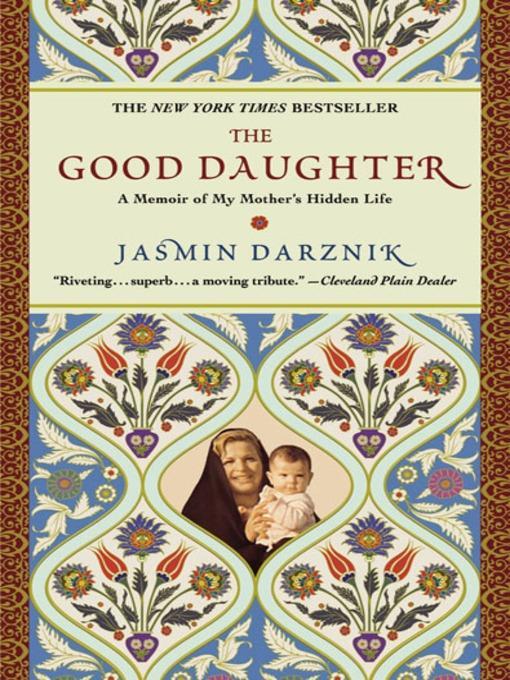
The Good Daughter
A Memoir of My Mother's Hidden Life
- اطلاعات
- نقد و بررسی
- دیدگاه کاربران
نقد و بررسی

November 29, 2010
When Darznik (an English professor at Washington and Lee University) stumbles upon a photograph of her mother appareled and made up as a bride with a man not Darznik's father, she catches a glimpse into her mother's hidden Iranian history, a past that contains a former abusive husband and an abandoned daughter. Through cassette tapes made by her mother, Darznik recovers the lives of three generations of Iranians: her great-grandmother Pargol; her grandmother Kobra, whose marriage involves "countless separations, two divorces, and many more near divorces"; and her mother, Lili, in an account deeply enmeshed with other women's lives—aunts, mistresses, and in-laws. Darznik's telling veers closer to ethnography than memoir at times—courtship and marriage formalities, the complications of divorce for women, food preparation, household tasks, workplace details. Yet while the lives of Pargol, Kobra, and Lili are circumscribed by broad cultural strictures, each moves further toward unique individuality than her predecessor. Lili, married that first time at 13, does finish school, becomes a midwife, marries Jasmin's father (a German who converts to Islam to marry her), flees the Islamic revolution with her new family in 1979, makes a new life in the United States, and raises an American daughter.

November 15, 2010
Richly detailed memoir by a daughter who, as an adult, learned of her Iranian mother's secret past: arranged marriage at 13, a baby at 14 and divorce while still a teenager.
After Darznik (English/Washington and Lee Univ.) found a photograph of her mother Lili as a child bride, Lili recorded for her a series of tapes about her family and her life in Iran. Lili's story begins with her grandmother, whose daughter Kobra is Lili's mother and a continuing and forceful presence in her life. Darznik's memoir is not a transcription of audio tapes, however, but an expansion of them into an engaging account of life in Iran in the 20th century, full of memorable characters whose lives take unexpected turns. The author's portrayal of Iranian society and male-female relations are revealing, and her descriptions of clothing, food and drink are especially engrossing. To escape from her marriage to a sadistic husband, Lili was forced to leave her baby with him. Eventually, she moved to Germany, trained as a midwife and acquired a European husband. Returning to Iran, Lili thrived in her new career, but her husband drank too much and failed in business. Threatened by the Iranian Revolution in the late '70s, the family fled to the United States when the author was five, settling in California along with hundreds of thousands of other Iranian émigrés. Since divorce was considered as shameful as prostitution, Lili kept her past a secret. While Lili remained Iranian to the core, retaining the values of her native culture, the author grew up as an American, failing to become "The Good Daughter"—the modest, obedient girl with perfect manners that her mother held up as a model. It was only when she learned of her mother's past and of the existence of her older half sister in Iran that she understood that "The Good Daughter" was a real person, not just a figure in a cautionary tale.
An eye-opening account that disturbs with its depiction of the place of women in Iranian society, but warms the heart in its portrayal of their gritty endurance.
(COPYRIGHT (2010) KIRKUS REVIEWS/NIELSEN BUSINESS MEDIA, INC. ALL RIGHTS RESERVED.)

December 15, 2010
Raised in California, Darznik never imagined that her mother Lili lived another life completely in Iran before marrying Darzniks German father. Lili was married off at 14 to Kazem, a man who would prove to be violent and abusive. Lili gave birth to a daughter, Sara, but when Kazems abuse escalated, Lili knew she had no choice but to flee his house and seek a divorce. The move cost her Sara, as Iranian law dictates children stay with their fathers. Lili decided to go to school in Germany to become a midwife, but the sudden death of her father forced her to come back to Iran to earn money for her own and her brothers schooling. When she returned to Germany, she drew the attention of the earnest German engineer who became her husband and the father of her second daughter, Darznik. Taken from tapes her mother sent her after Darznik discovered a photograph from her mothers first wedding, Darzniks memoir is a beautifully recounted homage to her mothers life and struggles.(Reprinted with permission of Booklist, copyright 2010, American Library Association.)




دیدگاه کاربران